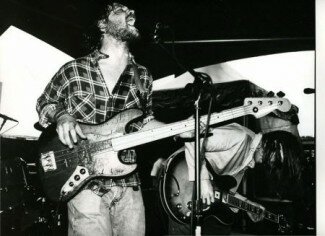Leaman's vision: Soaking in Dr. Dog's '60s comparisons
 Dr. Dog's Frank McElroy, left, and Scott McMicken are nicknamed "Thanks" and "Taxi", respectively. The pop-rockers play Gravity Lounge February 24.
Dr. Dog's Frank McElroy, left, and Scott McMicken are nicknamed "Thanks" and "Taxi", respectively. The pop-rockers play Gravity Lounge February 24.PUBLICITY PHOTO
Despite the rise of electronic and psychedelic rock, Philadelphia-based pop-rockers Dr. Dog unabashedly look back to the 1960s. Mistake the opening strains of this quinet's 2008 album, Fate, for a lost Beach Boys record or a never-before-heard Beatles track, and they'll be pleasantly pleased. Just don't call them irrelevant or trivial.
"We're trying to write songs that we want to hear," says vocalist and bassist Toby "Tables" Leaman. "We're offended when people act like what we're doing is just rehashing old ground– that would be pointless if that was our intent."
With his fellow songwriter and guitarist Scott "Taxi" McMicken, Leaman seems to have created something that operates more as a UVA-style secret society than a grungy garage band. Given the name and its Philly base, Dr. Dog has been frequently mistaken for a hip-hop group.
But in 2004, they were brought into mainstream prominence by opening for folk-rockers My Morning Jacket during a 2004 U.S. tour.
As much of the music world experiments with computer-aided rhythms and beats, a growing number of artists– lead by Dr. Dog– turn to the past for inspiration. Think three-part harmonies, low-fi recordings, and nostalgic imagery. Leaman explains how it all happened.
The Hook: Dr. Dog is constantly compared to '60s groups, like the Beach Boys and the Beatles, and more contemporary bands, like Pavement. How do you feel about those comparisons?
Toby Leaman: It's better to be compared to great bands than sh** bands.
The Hook: With your album covers, your image, your lyrics, you've been labeled as "Americana." Is that accurate?
TL: I would say we're definitely rooted in Americana more than other pop-rock bands, and we're not squeamish at all about the term "pop-rock."
The Hook: How has Fate, your latest album, grown from 2007's We All Belong?
TL: Not much has changed from when we first started recording– we make music that we want to hear, music that we love. With Fate, we were a little more focused, had a little more discipline within ourselves to get it done in a relatively quick manner.
The Hook: While Fate garnered generally high reviews, some critics said it was full of unfulfilled potential. How do you respond?
TL: I would say we're capable of better, and we're better since we did that album.
The Hook: Has this shown through during this latest tour?
TL: About two weeks before the album came out, I got hit in the throat and still haven't fully recovered. On my birthday, my wife and I were in an inner tube and hit a wave. My neck was coming down, her head was coming up. So the first part of the touring was frustrating, because we had all these new songs ready to go, and I couldn't perform all of them. But after I recovered enough to start doing some of those songs, we hit the road pretty heavily.
The Hook: Being from Philadelphia, are you constantly mistaken for a hip-hop group? Is there a rock scene in Philly?
TL: It seems like there wasn't a rock scene in Philly for a long time, so it was definitely known more for hip-hop.
The Hook: My Morning Jacket really brought Dr. Dog into mainstream prominence when they brought you along on their 2004 tour. How is Dr. Dog close to them, musically?
TL: The first time I heard the Jackets, I got so into it– it sounded like a glorified home recording, which was exactly what we were doing for years. I feel like very kindred spirits with them.
The Hook: How did Dr. Dog come about?
TL: Scott and I met when we were kids, and at 12 or 13, we started playing together. It took almost a decade to realize what kind of band we wanted to be. When we did, it was just a matter of finding the right guys.
The Hook: What's with the nicknames? [All members of the band play under a moniker that starts with the letter 'T']
TL: It's really not that cool. When we first started playing with the first guys of Dr. Dog, we decided to make it like a club. When you came into the club, which was the band, you got a nickname. It's not the most thought-out thing in the world, just a way to separate yourself from everyday life. We never really call ourselves those nicknames.
The Hook: What can we expect from your Gravity Lounge show?
TL: We're a pretty drastic change live from our recording. We're firm believers that the record and live shows are two separate things and have to be for them to fulfill their potential. There are tons of stuff you can do in a studio that you can't do live and vice versa.
Dr. Dog performs at Gravity Lounge on Tuesday, February 24. $10, 9pm.
#